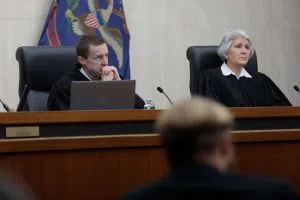
North Dakota Supreme Court Chief Justice Jon Jensen, left, and Justice Lisa Fair McEvers hear arguments Dec. 18, 2023. On Thursday, the court struck down a Fargo ordinance regulating home gun sales. (Kyle Martin/For the North Dakota Monitor)
(Mary Steurer – North Dakota Monitor) – The North Dakota Supreme Court this week struck down a Fargo ordinance prohibiting the sale of firearms and ammunition in residential zones, upholding a lower court’s ruling that found the ordinance violates state law.
The decision stems from a lawsuit filed by the city of Fargo in 2023 over a new state law that restricts the ability of local governments to regulate gun and ammunition sales.
The law, adopted by lawmakers during the 2023 session, holds that local governments cannot adopt zoning ordinances related to the “purchase, sale, ownership, possession, transfer of ownership, registration, or licensure of firearms and ammunition.”
Fargo, which had had a zoning ordinance regulating the sale of guns and ammo on the books for several years, sued the state over the law, arguing that it is an unconstitutional violation of local control.
In February, a district court threw out the case, concluding that the law does not violate the rights of local governments. It also found that under the new law, Fargo’s local ordinance banning the sale of guns and ammo in residential areas cannot be enforced.
The city appealed the decision to the North Dakota Supreme Court.
In a September hearing, the high court heard arguments from both parties.
An attorney for the city of Fargo warned that allowing the state law to repeal Fargo’s ordinance would hamper cities’ ability to self-govern. He pointed to a provision in the North Dakota state constitution that states North Dakota political subdivisions are to exercise “maximum local self-government.”
An attorney for the state countered that the constitution does not allow for local governments to be completely autonomous, and that the Legislature determines the scope of local law.
In the Supreme Court’s opinion, published Thursday, the court upheld the district court’s ruling. The state constitution holds that “each political subdivision shall have and exercise such powers as provided by law,” the opinion states. This language gives the state Legislature the authority to delineate the lawmaking power of cities, the court wrote.
The Supreme Court concluded that the state law “constitutes a valid exercise of its constitutional authority to create political subdivisions and, specifically, to define the powers of a home rule city.”









